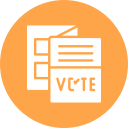Why Online Voting is Secure, Accessible, and the Future of Elections
The global move toward online services has revolutionised industries from banking to healthcare. But when it comes to online voting, many still harbour doubts. Is it secure? Can my vote be tampered with? How do I know my vote will count? All legitimate concerns, especially when it comes to the democratic process.

Amy Hood
October 14, 2024




The global move toward online services has revolutionised industries from banking to healthcare. But when it comes to online voting, many still harbour doubts. Is it secure? Can my vote be tampered with? How do I know my vote will count? All legitimate concerns, especially when it comes to the democratic process. This post addresses those concerns, by showing why online voting is a secure, accessible and efficient solution for elections.
The Importance of Security in Online Voting
When discussing online voting, security is often the first issue that comes to mind. Given the sensitivity and importance of voting data, it’s crucial that online voting systems are designed with the highest standards of protection. Here’s how online voting ensures security:
By incorporating these cutting-edge technologies, online voting platforms are able to protect the integrity of elections in ways that exceed traditional paper-based voting. Accessibility: Expanding Democratic Participation One of the most compelling advantages of online voting is its accessibility. Traditional voting methods can be inconvenient and, in some cases, even inaccessible for many eligible voters. For example: Voters with Disabilities:
For voters with physical disabilities, travelling to a polling place or handling paper ballots may be difficult. Online voting allows them to participate fully and independently, increasing their ability to engage in the democratic process. Voters Living Abroad: Many people who live or work abroad, such as military personnel or expatriates, face logistical challenges with traditional voting. Online voting allows these individuals to participate in elections securely from any location without the risk of their ballots being delayed or lost. Remote Areas: Individuals living in rural or remote areas often struggle with long travel times to polling stations. Online voting eliminates the need for travel, allowing them to vote from the convenience of their home, regardless of their location.
Busy Professionals and Caregivers: Finding time to vote in person can be difficult for people juggling work and family responsibilities. Online voting enables busy individuals to cast their ballots at any time, reducing the chances that life’s demands will prevent them from participating in an election. By making voting more accessible to all, online voting strengthens democracy by ensuring more voices are heard. Increasing the Accuracy and Validity of Votes Another significant advantage of online voting is its potential to improve the accuracy and validity of election results.
These features not only increase the accuracy of individual votes but also enhance the overall reliability of the election process. Common Concerns About Online Voting Despite the benefits, scepticism about online voting persists. Here are responses to some common concerns: Can online voting be hacked? Modern online voting platforms use robust cybersecurity measures, including encryption, and independent audits, to prevent hacking. While no system is completely immune to cyber threats, online voting systems are designed to detect and respond to any attempt at interference, ensuring the integrity of the election.
How do I know my vote is counted correctly? Online voting systems often provide a receipt or confirmation number after a vote is cast. This allows voters to verify that their votes have been recorded and counted correctly without revealing their voting choices, preserving privacy. What if I don’t have access to technology? While online voting is a convenient option, it is not meant to fully replace traditional methods. Instead, it serves as an additional option for those who prefer or need to vote digitally. Traditional in-person and postal voting options remain available for those without access to reliable technology or the Internet. The Future of Online Voting As we continue to embrace digital solutions in every other aspect of life, online voting will inevitably play a larger role in our elections. Already, several countries and jurisdictions have implemented online voting with great success, including Estonia, which has been a pioneer in this area since 2005.
The online voting movement is not just about convenience; it is about improving the democratic process. By making voting more secure, accessible, and accurate, online voting enhances the integrity of elections and ensures that every voice is heard. The Conclusion Online voting is an evolution in how we conduct elections. Advanced security technologies ensure that votes are secure and cannot be tampered with, making voting far more accessible for those who face challenges with traditional methods. And by reducing human error and providing immediate feedback it increases the accuracy and validity of the results. The future of elections is digital, and as more people come to trust and understand online voting, it will undoubtedly become an essential tool in strengthening our communities.





